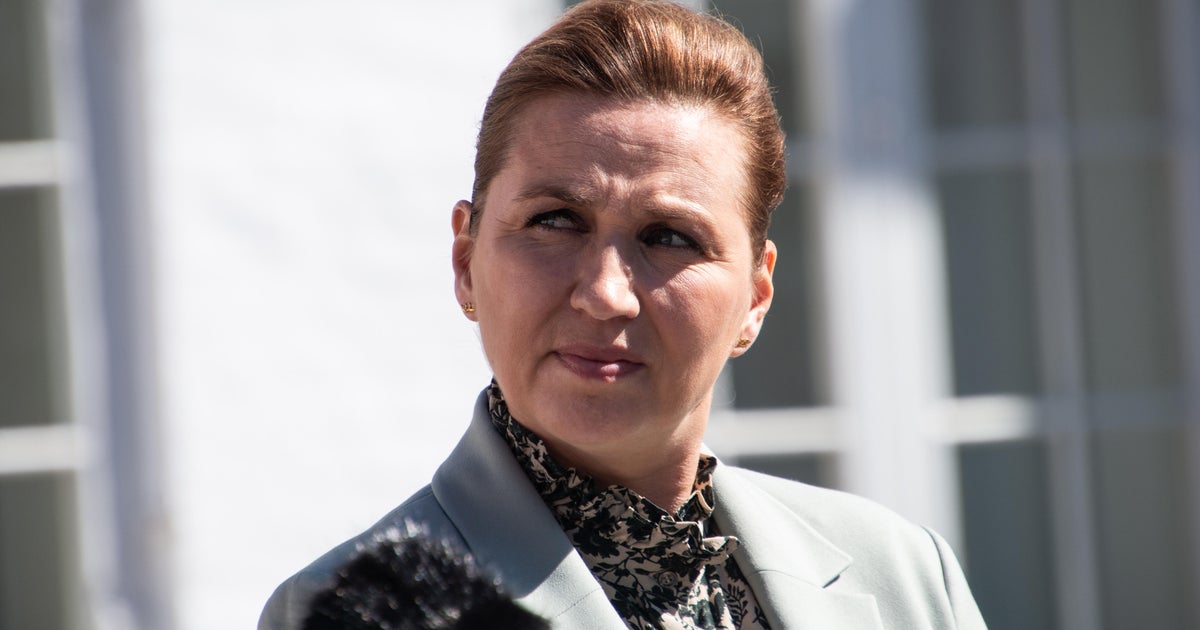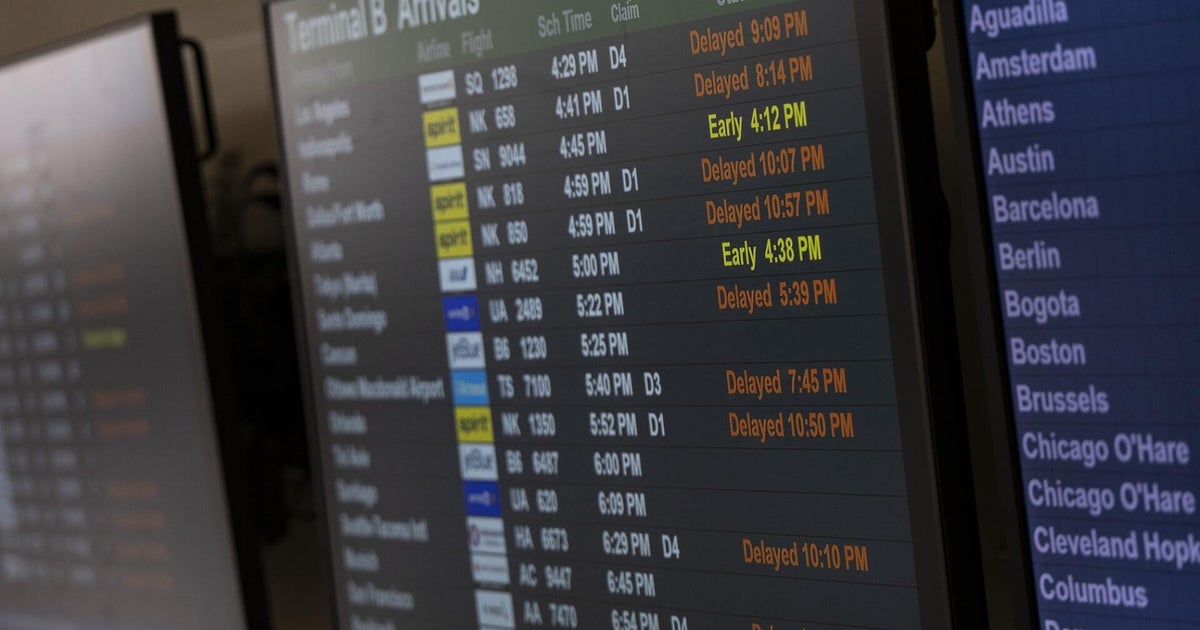New Delhi — A deadly terrorist attack in Indian-administered Kashmir's picturesque Pahalgam area in April has brought India and Pakistan once again to the brink of war. The nuclear armed South Asian neighbors have attacked each other this week with missiles and drones in a sudden flare-up of a decades-old feud that's being watched with concern by leaders around the world.
The bitter rivals have fought three wars over Kashmir in the past, and once again they're warning each other against any moves that could escalate the tension — and vowing to respond in kind to any such moves with tough military action.
After a week of intense clashes, air raid sirens blared in a couple Indian cities near the Pakistani border on Friday and authorities asked people to remain indoors. Officials said a woman was killed and four men injured in alleged Pakistani cross-border fire in the Kashmiri town of Uri, while all major airports and the capital city of Delhi were on high alert, with some schools shut and major landmarks evacuated.
Pakistani officials have accused India of killing at least 36 people this week, including 26 it says died in a Tuesday night missile attack on multiple locations, which Islamabad labeled an "act of war." India called the strikes a measured response to the April terrorist attack, claiming it had killed 100 terrorists at camps and other sites in Pakistan and Pakistan-administered Kashmir.
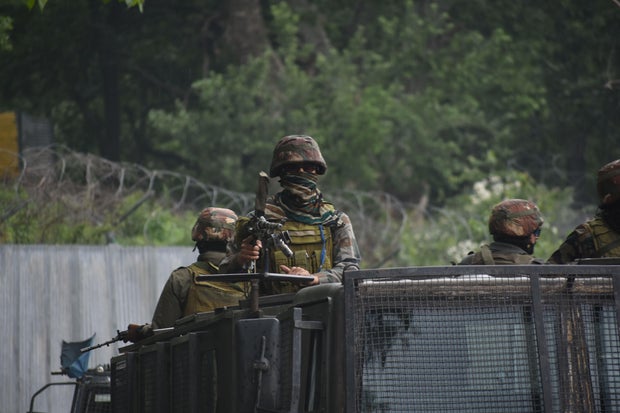 An Indian Army vehicle moves through a street in Uri, in Indian-administered Kashmir, as tension between India and Pakistan rises May 8, 2025.
Faisal Khan/Anadolu/Getty
An Indian Army vehicle moves through a street in Uri, in Indian-administered Kashmir, as tension between India and Pakistan rises May 8, 2025.
Faisal Khan/Anadolu/Getty
The rivalry between the two countries goes back decades, and at the heart of the dispute lies the stunning mountainous region of Kashmir.
The Kashmir conflict explainedKashmir is a Himalayan region dotted with snow-capped mountains, pristine lakes, and beautiful meadows. It was previously one of the many "princely states" of India, ruled by so-called maharajas, before India gained independence from British rule in August 1947.
That independence, however, has never been a simple matter. As it ceded its colonial power, Britain partitioned India into two nations: Hindu-majority India, and Muslim-majority Pakistan.
The migration of Hindus from the newly carved out Pakistan into India, and of Muslims from India into Pakistan, was marred by massacres and widespread sectarian violence. It is widely considered the deadliest partitioning of a nation in contemporary history.
At the time of partition, Kashmir was a Muslim-majority princely state, and its Hindu Maharaja Hari Singh, chose to remain independent of the two newly defined nations. But in October 1947, when tribesmen from Pakistan invaded Kashmir, the Maharaja sought India's help.
India agreed to come to his assistance, but only if Singh would let India claim dominion over Kashmir as a precondition. The Maharaja agreed.
India sent its army to Kashmir, which drove out the Pakistani tribesmen and, for all intents and purposes, Kashmir became a semi-autonomous part of India.
India and Pakistan's wars over KashmirPakistan refused to recognize Kashmir's accession to India, dismissing it as a fraud. The standoff led the two nations into their first war that same year, and it endured into 1948.
India asked the United Nations to intervene. The U.N. recommended that, after the full demilitarization of the region by both armies, a vote be held by Kashmir's residents to determine its future.
That was never achieved, and in 1949, India and Pakistan signed a ceasefire agreement that divided hotly-contested Kashmir into two parts.
Both nations claim all of Kashmir as their own territory, but each controls only part of it. Another, northeastern portion of the region is administered by China, which has long been a point of friction between Delhi and Beijing.
In 1965, the tension over the region between India and Pakistan again erupted into a full-scale war. Thousands of people were killed on both sides. About seven years later, an agreement was signed that formally established a Line of Control (LoC) dividing Kashmir, which still serves as the de-facto border between the two rivals.
In 1989, a heavily armed pro-independence insurgency took root in Indian-administered Kashmir, launching deadly attacks against Indian forces. India has long accused Pakistan of training, arming and backing those militants — a charge Pakistan flatly denies.
The three-decade insurgency has left tens of thousands of people dead.
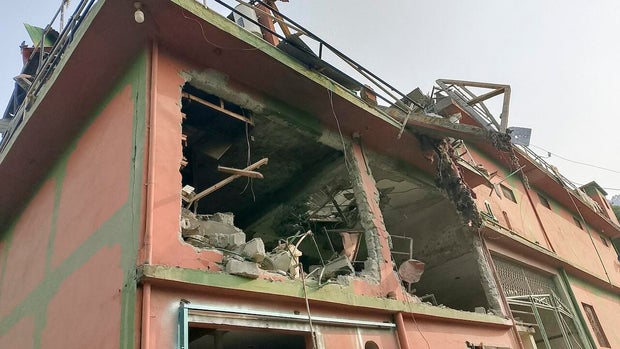 Damage to a mosque is seen after Indian strikes in Muzaffarabad, the capital of Pakistan-administered Kashmir, May 7, 2025.
Zubair Abbasi/Middle East Images/Middle East Images/AFP
Damage to a mosque is seen after Indian strikes in Muzaffarabad, the capital of Pakistan-administered Kashmir, May 7, 2025.
Zubair Abbasi/Middle East Images/Middle East Images/AFP
Pakistan has consistently denied the allegations that it supports Kashmiri separatists.
In 1999, the two countries again engaged in a brief war, fought along the LoC in northern Kashmir.
They almost went to war again following the deadly terror attack on India's commercial capital Mumbai in 2008, which was carried out by a militant group based in Pakistan-administered Kashmir — with, Indian authorities alleged, the full support of Pakistani security forces.
India removed Kashmir's autonomy in 2019As the insurgency continued, India maintained a heavy military presence in Kashmir, making it one of the most militarized zones in the world. Indian forces have killed hundreds of separatists every year in regular shootouts across and around the LoC, but they have not managed to stop the militants' attacks.
In 2016, gunmen whom India said were based in Pakistan killed 19 Indian soldiers in an attack on the town of Uri. India responded by launching what it called "surgical strikes" across the LoC, targeting alleged militant bases. Pakistan denied any Indian strikes on its territory.
In 2019, another attack blamed on alleged Pakistani gunmen, on an Indian military convoy in Kashmir's Pulwama area, killed more than 40 paramilitary forces.
Indian Prime Minister Narendra Modi, furious over the attack, ordered airstrikes against Pakistan, sparking retaliatory raids and an aerial dogfight in which one Indian fighter jet was downed.
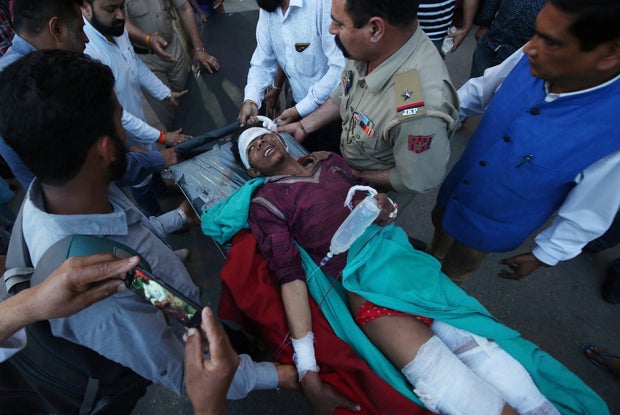 A civilian, who according to local media was injured in a cross-border shelling near the Line of Control (LoC) with Pakistan in Poonch sector, is rushed to a hospital in Jammu, in Pakistan-administered Kashmir, April 1, 2019.
REUTERS
A civilian, who according to local media was injured in a cross-border shelling near the Line of Control (LoC) with Pakistan in Poonch sector, is rushed to a hospital in Jammu, in Pakistan-administered Kashmir, April 1, 2019.
REUTERS
Later that year, India's federal government, under Modi, revoked Kashmir's special status, lifting the partial autonomy it had enjoyed since 1947, which granted the region its own constitution and major decision-making powers.
Modi's government faced criticism for the way it revoked Kashmir's autonomy. A day before his government tabled and passed the bill in parliament, Indian forces launched a major crackdown in Kashmir. Internet, television and phone lines were shut down, and civilians were ordered to remain indoors. Dozens of people, including local politicians, were placed under house arrest as India flew more paramilitary forces into the region to maintain a security and information lockdown. Some of those restrictions remained in place for more than two years.
Pakistan objected to the move and vowed to "exercise all possible options to counter the illegal steps."
Over the following years, as India continued to bolster its security presence in the region, militancy waned and tourism returned to Kashmir. Modi's government took credit for transforming the region from a hotspot for terrorism, into a hotspot for tourism.
But last month's terrorist attack on Indian tourists in Pahalgam changed everything. It has once again put the two nations on a war footing - and the world on edge over the risk of another major conflict breaking out in already-tumultuous times, and between two nations with a long history of animosity, and nuclear weapons.



